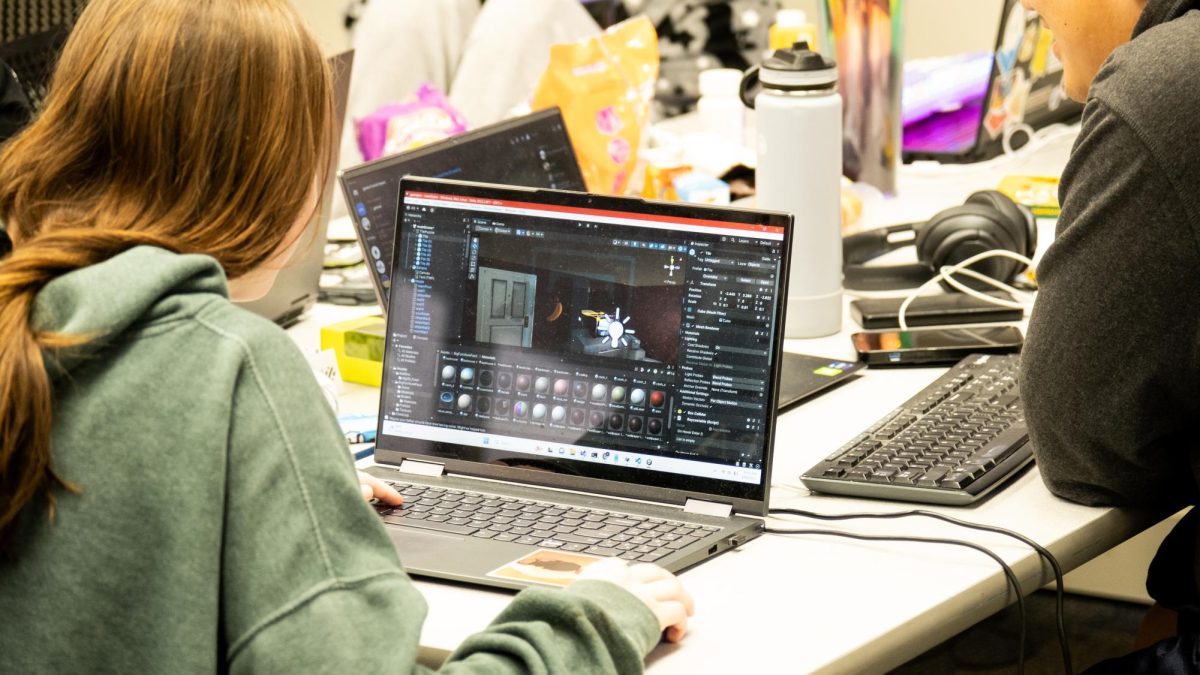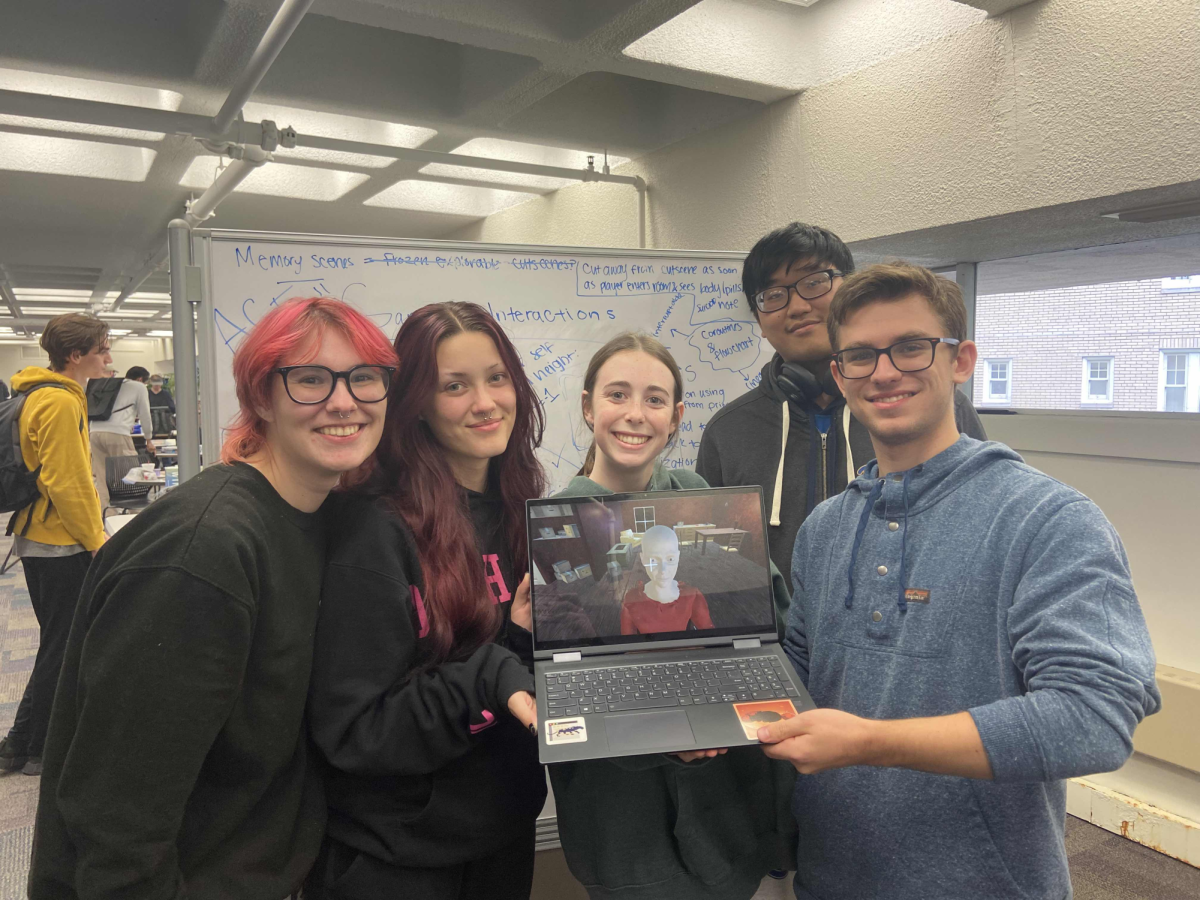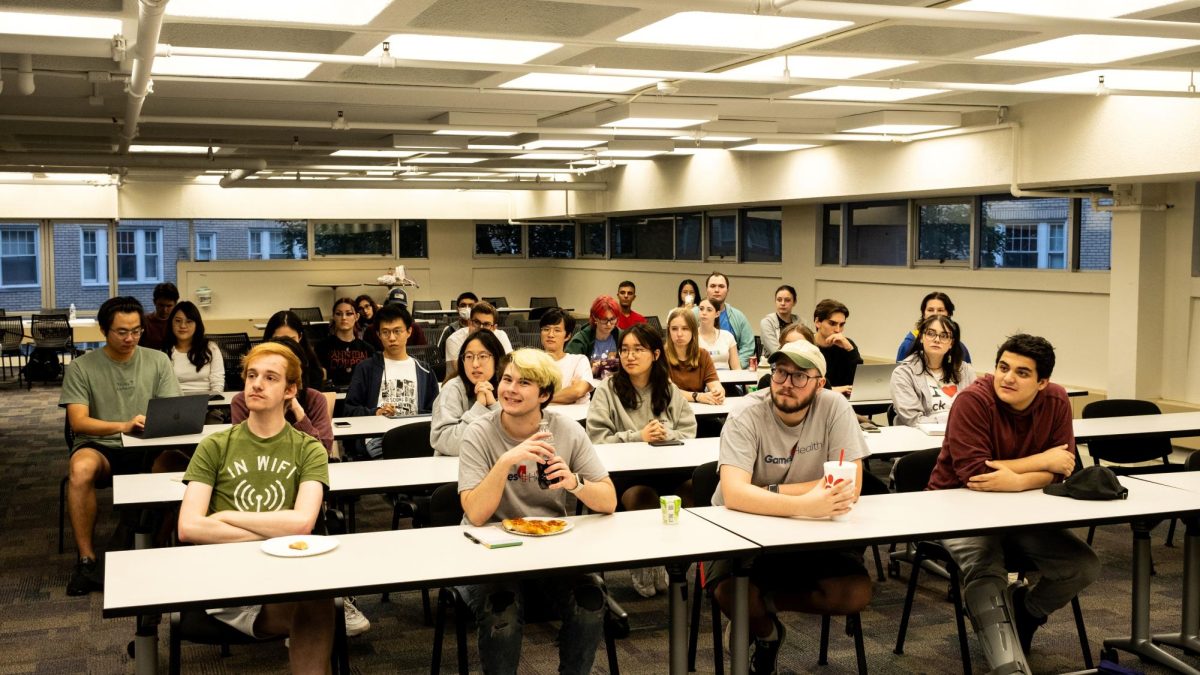In the dead of night after 20 hours of game development, Oscar Mailman leaned back from his laptop screen, got up from his chair and let out a sigh.
“I’m never making fun of a shitty game ever again,” Mailman, a junior digital narrative and interactive design major, said.
About 30 students participated in Games4SocialImpact, an annual game jam in the Information Sciences building where programmers, storytellers and artists called “jammers” join to create games on Oct. 7 and 8. Jammers are tasked with making their games impactful, whether that is through educating players, providing social commentary or making a game with useful real-world applications. Teams are only given 27 hours to plan, design, code and submit a game based on a theme that isn’t revealed until the night before the event.
Dmitriy Babichenko, a clinical associate professor in the School of Computing and Information, founded Games4SocialImpact in 2017 after considering how gathering students from a variety of disciplines could yield games with practical benefits. Babichenko said he continues to hold the event because it’s fun, but emphasized how he wants to see Pitt develop a “broader curriculum” around games.

“I love seeing students engage in this more,” Babichenko said. “There’s a lot of potential across almost every discipline — engineering, health care, education — for games to provide impact.”
On Friday night, event mentor and doctorate student Pat Healy revealed this year’s theme as “age.” They said the theme is intended to “be interpreted in a few different ways.”
“Giving a theme like ‘age’ … hopefully primes people to be thinking a little bit outside of just one thing,” Healy said. “It lets them follow something that maybe they’re already interested in.”
Diego Jurado and Radley Lettich, both computer science majors, teamed up with Zander “Spike” Spik, a senior DNID major, as well as Jagr Krtanjek and Seán O’Rourke, both CS and DNID double majors, to form a team. The five friends created Team SPAGRLIEGO, a mash-up of the members’ names.
Krtanjek said his team began brainstorming ideas instantly by “passing around a notepad and jotting down ideas,” while mentors gave advice for having a successful game jam.

The team quickly narrowed in on an idea for a game called “Immorticulture,” a shop simulator where the player is an immortal farmer who grows plants and has to learn new agricultural techniques throughout the ages.
“Generally in these you should do the due diligence to come up with as many concepts as you can before you decide on one,” Krtanjek said. “We didn’t really do that because we were so in love with this idea.”
Mailman teamed up with Erin Dougal, Grace Ward and Kyra Schultz, all DNID majors, as well as Sam Wang, a junior CS and DNID double major, to form Game Studio Incorporated. While they knew each other from classes, none of them had ever worked on a shared project before.
After numerous pitches, Game Studio Incorporated had an ambitious plan for a game that would be titled “Memoriam,” a claustrophobic horror game with themes of childhood trauma where the player has to take care of their abusive mother. The group expressed worry over finishing the game in time, but Mailman said the game jam’s intention isn’t to make something “100% consumer ready.”
“We have a really good concept that’s on the page,” Mailman said. “If we’re not quite satisfied with the final project, we could work on it after that.”
All teams went home to brainstorm and prepare for the weekend ahead at 9 p.m. on Friday night.

When jammers returned the next morning to start developing their games, many came prepared with supplies to last the day. O’Rourke was armed with over a dozen bottles of Diet Coke, Ward came with a duffel bag of snacks and their keyboard and mouse from home, and Spik brought granola bars and a pillow.
Spik said he scheduled time off from his full-time job at IKEA to participate in Games4SocialImpact. With this as his first game jam, Spik said he signed up to gain experience doing game development with a team.
Others like Wang, who has participated in game jams before, said they’re an opportunity to “work with like-minded people.”
“It’s just really enjoyable,” Wang said. “Spending a lot of time just trying to make a game that works and based on the idea we created … this is just like a live experience of actually creating an actual game.”
Krtanjek, who said this is his fourth year participating in Games4SocialImpact, said he keeps doing game jams for “the camaraderie.”
“You bond with people no matter what in environments where you’re staying up really late in the middle of the night,” Krtanjek said. “I’ve had a lot of meaningful connections through game jams and hackathons and whatnot that have lasted a while, and I’ve formed a lot of new ones.”
Early into the development of “Immorticulture,” the team decided to scale down the scope of the game to better fit the game jam’s short time limit. Originally intended to be a shop simulator, the game is now narrative-driven and consists of meeting characters throughout the ages while completing minigames that grow progressively harder in order to keep the “tree of life” alive.
Game Studio Incorporated, however, didn’t realize the need to scale down their game until 4 a.m. on Sunday morning.
“We had too many ideas and not enough time,” Ward said later Sunday morning. “We went from this really elaborate story that we had planned out, to ‘run around the house and find these puzzle pieces.’”
As time to submit a game dwindled down and the clock struck noon on Sunday morning, 27 hours of game development officially ended.
Lettich compared the feeling of finishing the game jam to a MasterChef episode.
“They just barely finish the meal, but not quite, it’s not really presentable — I feel like that’s our state right now,” Lettich said.
After a lunch break, jammers crowded around each other’s laptops to play the games other teams had created over the course of the weekend.

Schultz called the experience of watching someone play her team’s game “a little anxiety-inducing.”
“We spent the whole weekend working on it, but we’re still very aware of certain bugs,” Schultz said. “It’s also really interesting to see how someone navigates this space that we’ve been working with for so long. It’s very rewarding as well.”
Jurado expressed satisfaction over seeing others play his team’s game.
“I think it’s one thing to see them play the game — I think it’s another to see them actually succeed and enjoy the game,” Jurado said. “I’m really happy we were able to put together something that at least looks this nice.”
The awards ceremony on Sunday afternoon offered board games as prizes for the games winning the awards of judge’s choice, jammer’s choice, artistic achievement, narrative achievement and “First Penguin,” an award given to the team whose game tried something exciting but ultimately didn’t work out.
After the event’s mentors and organizers played all of the submitted eight games, “Immorticulture” was awarded judge’s choice. After each team member chose their board game prize, Jurado said he “didn’t even know there was a prize.”
“I was just here because my good friend Radley, my other two friends that I met recently, invited me to this,” Jurado said. “This is my first time. Great time, fun time, going to do it again.”
“Memoriam” was awarded jammer’s choice after getting an average rating of 4.071 out of 5. Dougal said the recognition for her team’s hard work felt “great.”
“I did not care about the actual awards, I just thought it would be a fun challenge to try and build a game in such a short amount of time,” Dougal said. “As people who want to go into game development, it’s such a cool thing to be a part of [and] you can’t really pass that up.”
O’Rourke encourages anybody interested to attend Games4SocialImpact next year.
“It’s just such an incredible experience and I’d recommend [it] for anyone who’s thinking of trying something like this,” O’Rourke said. “Even if they think they don’t have the skills, even if they don’t think they have the friends, even if they don’t think they have anything, just try it out because I think it’s a wonderful experience.”



